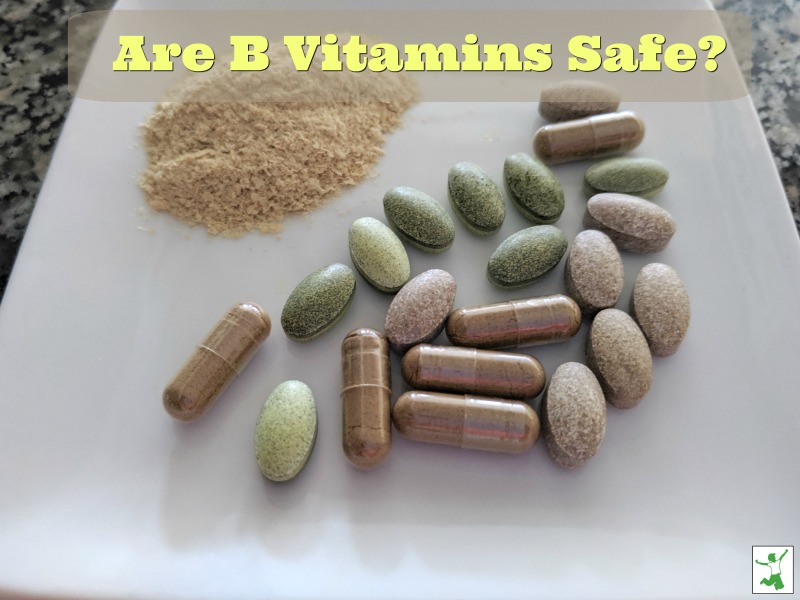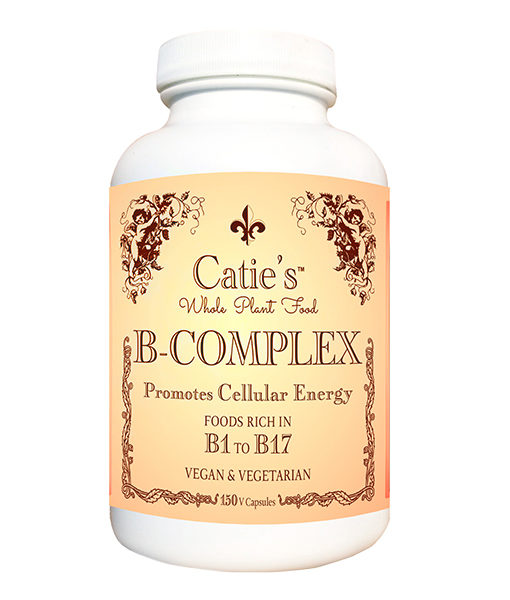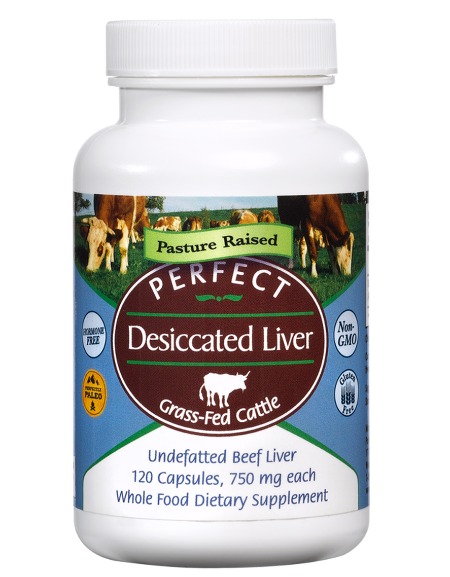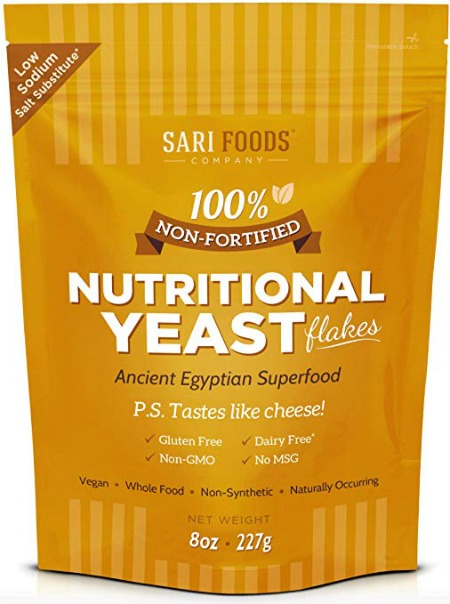
If you’ve been searching for a good quality Vitamin B supplement, no doubt you’ve found the process discouraging! Anyone with any sort of gut imbalance is especially in need since beneficial flora manufacture some of these critical nutrients for us. (1)
It seems that every single brand includes one or more synthetic vitamins even those that claim to be whole-food-based.
Ironically, foods that naturally contain B complex are almost always fortified too.
A good example of this is (nutritional) brewers yeast, which contains folic acid, the synthetic form of folate.
Folic acid can harm the health of those with MTHFR genetic mutations. Estimates are that up to 50% of some ethnicities have at least one variant.
Prenatal vitamins and all multivitamins have this same problem, by the way! Go ahead and look at the label of the bottle you have in the pantry right now. It lists folic acid, doesn’t it?
Thus, buying a whole food form of B complex is no guarantee that you are getting what you think you are getting…natural vitamins ONLY with zero synthetics.
In other words, manufacturers seem to be able to slip one or more lab-derived ingredients in there and still label it a natural B complex.
I’m not exactly sure how they pull this off legally, but as a consumer, you need to be aware it’s happening so you can avoid becoming ensnared in shadowy marketing spin to the detriment of your health.
Natural Vitamin B Complex
What vitamins are contained in B complex anyway? Here are the nine I look for. Note that B17 isn’t usually included in conventional definitions.
- thiamin (vitamin B1)
- riboflavin (vitamin B2)
- niacin (vitamin B3)
- pantothenic acid (vitamin B5)
- vitamin B6
- biotin (vitamin B7)
- folate (vitamin B9)
- cobalamin (vitamin B12)
- amygdalin (vitamin B17)
Why should you avoid synthetic versions of these vitamins? The reason is that synthetics can cause imbalances or even trigger a health crisis for those with certain genetic mutations.
Researchers have found that natural forms of B vitamins work as well or better than synthetics anyway, so why take the risk just because they’re cheap? (2)
Over the years, as I’ve combed through the dozens of brands of B complex supplements, I’ve discovered that there simply isn’t one that provides all 9 of these nutrients from food sources alone.
However, you can easily get them all by combining!
Here are the three truly natural, unfortified sources of B complex that I have in my home. I like to rotate them so I get everything I need…no synthetics required!
Real Food B Complex
If you prefer to take B complex capsules, Catie’s Whole Food B Complex is a good one to use.
It only contains food and herbs with no sneakily added synthetics. It even contains Vitamin B17, which is next to impossible to find together with other B vitamins. 
The only problem with this supplement is that it is plant-based, hence it does not contain any true vitamin B12 (contrary to what the label says).
Vitamin B12 is only found in animal foods like meat, eggs, and dairy. Plant forms contain a B12 analog that is not bioavailable to the human body.
Desiccated Liver
To get Vitamin B12 in its natural form, you will need an animal-based supplement.
Liver is the best source of Vitamin B12. While you can certainly eat grass-fed liver once a week to get what you need, other people find it more convenient to take a raw, desiccated liver supplement.
I recommend two brands: Perfect Supplements and Radiant Life because their desiccated liver is un-defatted (nothing removed) and they test to ensure their products are free from glyphosate residue and other impurities.
While desiccated liver supplements contain almost all the B vitamins in abundance, they are notably missing Vitamin B17. This is which is why I use Catie’s Whole Food B Complex above as well.
Unfortified Nutritional Yeast
Another good source of truly natural B vitamins is nutritional yeast.
While it is true that nutritional yeast is an ancient Egyptian source of B complex, most brands today don’t emulate the traditional version!
If you want to consume this ancestral food like Cleopatra may have enjoyed (pickled cukes were apparently her fave though), only buy nonfortified nutritional yeast.
There are several brands of unfortified yeast currently available. This is the brand I’ve vetted and use.
Hint: it tastes amazing sprinkled on heirloom popcorn!
Is nutritional yeast bad for Candida sufferers? In a word, no.
The yeast is deactivated, so it has no chance to colonize or grow in the intestinal tract.
However, those that have mold allergy may have issues, so steer clear if you are one of these folks.
Finding the Best Vitamin B Complex
Ultimately, to get all the 9 vitamins within the B complex in completely natural form, my examination of the brands out there reveals that you need to supplement with BOTH animal and plant-based whole foods.
Animal food forms of B complex like liver powder are missing Vitamin B17. Similarly, plant-based B complex is missing Vitamin B12.
By choosing your source of B vitamins wisely, this problem is easily remedied by combining Real Food supplements such as the three listed above.










Hi Sarah. Thank you for your great articles. I really appreciate them. In my research, I have found that all corn is genetically modified. The mound builders genetically modified it for survival reasons. I can’t seem to find the article I read, but a farmer recently told me corn is naturally a very short plant. I mention this because of your recommendation above regarding heirloom corn. What have you found?
I think you are confusing genetically modified with hybridized. They are quite different although the media likes to conflate them to confuse consumers into thinking GMO foods are safe because hybridized crops have been consumed for thousands of years. With regard to corn, not all corn is genetically modified at all. In fact, nonGMO corn is making a comeback. A few years ago, around 90% of the corn grown was GMO in the USA, but that percentage is rapidly declining.
Hi Sarah. A questions on oral b12 supplements. Do to the fact that SO many people have gut issues and B12 is only absorbed in such a small/limited location of the gut (intrinsic factor). Are any of the orals actually going to be taken in or passed through. Would injectable B12 or complexes be better? Also, the types of B12 from what I have read, make a difference on your body’s ability to use. Methylcobalamin, Adenosylcobalamin, Hydroxycobalamin, and Cyanocobalamin.
That is a very good question. It is such an individual call … we rely on organ meats in the occasional dinner dish combined with regular desiccated liver supplements in our home to keep our B12 where it needs to be. As people get older, the risk of B12 deficiency becomes much greater, because as you say, the gut environment is no longer as good at extracting nutrients combined with gut imbalance that is rampant today. My Dad (MD) really liked the B12 injections. Injectable B complex is totally synthetic, so unless it is a doctor prescribed emergency, I would avoid. Usually, by the time someone sees a doctor about it, it REALLY IS severe in most cases (as in the case of vegans).
Otherwise, I think a sublingual methylcobalamin would be my personal preference. I must say, though, I dislike taking vitamins in isolation as a general rule because it acts more like a drug than a nutrient.
Definitely try the desiccated liver first. I’ve had so many people in my community even older people do SO WELL on this even with compromised digestion.
I need a B vitamin for my Kidneys the kidney Doctor said I should take them . He gave me prescription Rena-Vite
, it has dyes in it. Could you
Recommend a good B Vitamine for the kidneys. Thank you
Sarah, isn’t amygdalin a source of hydrogen cyanide, and thereby a poison (I know the pharmaceutical version of B12 is also a source of hydrogen cyanide, but that is because it picks up the cyanide from the KCN that is used in its isolation – cobalamin in vivo has no cyanide. In any case the concentration of cyanide is well below the danger level)?
Probably the amount of cyanide in the amygdalin you get from a reasonable helping of almonds is (also) pretty harmless, but what evidence is there that amygdalin is a vitamin at all?
I bother to write like this, because you are pretty genuine and genuinely generally informative.
Because the B17 source in this supplement is organic food only (apricot kernels) … it is a safe source in my opinion.
Thank you for your reply. So if a vitamin is not food sourced is that a good indication that it is synthetic?
Yes that is a very good giveaway! Even if not synthetic, isolated vitamins not in food form do not offer the synergistic benefits of vitamins in the proper proportions to each other as found in whole foods.
Hi Sarah, I’ve been buying Dr. Mercola’s B complex spray for my daughter who doesn’t eat meat but eats eggs, fish, butter. She has a hard time swallowing pills. Have you looked into that product, and if so, did you come to a conclusion? Thanks so much.
I only see a B12 spray from Dr. Mercola, not a B complex spray.
I take the B-12 spray and Mercola’s B-Complex. My B12 has always been a bit high and I only ate salmon. A recent blood test revealed my B12 was extremely low. Can’t figure out why. I am 68. Now I am eating healthy poultry also. And taking even more B12. I will try your liver supp. But it would be great if you could look at Mercola’s BComplex. The amounts are low, but I think its because of their quality??
Mercola B complex has folate and not folic acid, which is great. Also, the B vitamins are all natural, not synthetic. But, the B vitamins don’t come from food 100%. They are “bound” to organic quinoa sprouts according to his website, but the vitamins are still extracted and isolated from food … not food itself. I personally would not take this brand, although it is certainly better than most and Mercola has other products which are great.
Thank you for your research, Sarah. It has come at just the right time for me as I am looking into b-complex vitamins currently. I take several beef liver capsules a day from Vital Proteins, but I was looking into supplementing more with a product called B-minus from Seeking Health. It contains the b vitamins minus the folate and B12. But it does not have B17, which I have not heard of until now. I have one copy of each MTHFR gene mutation (C & A). So I am experimenting with adding my methlyfolate and methyl b12 slowly. Have you had any experience with Seeking Health products? If so, I would love to hear your opinion since they were not mentioned in your article. Thank you!
The Seeking Health B complex is, unfortunately, not something I would recommend taking. It doesn’t contain folic acid, which is good, but the B vitamins are not from food sources. Also, only one capsule a day is suggested… this is a giveaway that the vitamins are synthetic. A food based B complex would require multiple capsules per day.
I have read the while food based vitamins appear to be made from food sources, they begin making them with fermented synthetic vitamins. Do you know if Catie’s uses this process?
Catie’s does not use this process.
Does all vitamins have yeast in them?
So Sarah, when you say combining them, you don’t mean taking them at the same time… You mean taking one for a while then switching to the other for a while. Am I right? Also, how long is a while… Do you do a week of one and then a week of another or do you go a whole 30 days or a whole bottles worth? Thank you for the quic so Sarah, when you say combining them, you don’t mean taking them at the same time… You mean taking one for a while then switching to the other for a while. Am I right? Also, how long is a while… Do you do a week of one and then a week of another or do you go a whole 30 days or a whole bottles worth? Thank you for your research results. My natural doctor is pushing their version of B complex because they claim it is all natural. I find it highly suspect after reading your article.
Yes, I rotate them every few days. I don’t take them all at the same time.
If your doctor’s B complex lists folic acid, it’s not “natural”.
In reading your article on vitamin B complex, I’m reminded of an article you wrote that mentioned a desiccated liver product from New Zealand from a company that also makes desiccated organ Meats. Do you know the nutritional difference between the two?
Liver contains the most B vitamins … other organs offer different nutritional benefits. For example, desiccated heart would contain coenzyme Q10.
I like Paradise Herbs real food – no additive – capsules.
Shaklee B complex has Folic Acid but it’s not synthetic. They features a patented Bioactivated Absorption System™ designed to enhance absorption of folic acid. I think you need to check out Shaklee Supplements. I think you will be please about safe, naural, organic and clinical tested Shaklee Supplements are.
Folic acid, by definition, is synthetic. Unless the supplement specifically says “FOLATE” it is synthetic.